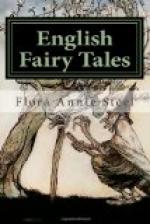“That’ll be rare and nasty,” replied the cook; but because she prided herself on having let Caporushes stir the gruel and so saved the young master’s life, she did as she was asked, and dressed every dish for the wedding breakfast without one mite of salt.
Now when the company sate down to table their faces were full of smiles and content, for all the dishes looked so nice and tasty; but no sooner had the guests begun to eat than their faces fell; for nothing can be tasty without salt.
Then Caporushes’ blind father, whom his daughter had seated next to her, burst out crying.
“What is the matter?” she asked.
Then the old man sobbed, “I had a daughter whom I loved dearly, dearly. And I asked her how much she loved me, and she replied, ’As fresh meat loves salt.’ And I was angry with her and turned her out of house and home, for I thought she didn’t love me at all. But now I see she loved me best of all.”
And as he said the words his eyes were opened, and there beside him was his daughter lovelier than ever.
And she gave him one hand, and her husband, the young master, the other, and laughed saying, “I love you both as fresh meat loves salt.” And after that they were all happy for evermore.
[Illustration: She sate down and plaited herself an overall of rushes and a cap to match]
THE BABES IN THE WOOD
Now ponder well, you parents
dear,
These words which
I shall write;
A doleful story you shall
hear,
In time brought
forth to light.
A gentleman of good account
In Norfolk dwelt
of late,
Who did in honour far surmount
Most men of his
estate.
Sore sick he was and like
to die,
No help his life
could save;
His wife by him as sick did
lie,
And both possest
one grave.
No love between these two
was lost,
Each was to other
kind;
In love they lived, in love
they died,
And left two babes
behind:
The one a fine and pretty
boy
Not passing three
years old,
The other a girl more young
than he,
And framed in
beauty’s mould.
The father left his little
son,
As plainly did
appear,
When he to perfect age should
come,
Three hundred
pounds a year;
And to his little daughter
Jane
Five hundred pounds
in gold,
To be paid down on marriage-day,
Which might not
be controlled.
But if the children chanced
to die
Ere they to age
should come,
Their uncle should possess
their wealth;
For so the will
did run.
“Now, brother,”
said the dying man,
“Look to
my children dear;
Be good unto my boy and girl,
No friends else
have they here;
To God and you I recommend
My children dear
this day;
But little while be sure we
have
Within this world
to stay.




